-
 Bitcoin
Bitcoin $113900
-1.39% -
 Ethereum
Ethereum $3517
-4.15% -
 XRP
XRP $3.009
1.59% -
 Tether USDt
Tether USDt $0.9997
-0.04% -
 BNB
BNB $766.8
-1.41% -
 Solana
Solana $164.6
-2.38% -
 USDC
USDC $0.9998
-0.02% -
 TRON
TRON $0.3277
0.65% -
 Dogecoin
Dogecoin $0.2023
-1.67% -
 Cardano
Cardano $0.7246
0.05% -
 Hyperliquid
Hyperliquid $38.27
-4.77% -
 Sui
Sui $3.528
-0.52% -
 Stellar
Stellar $0.3890
-0.73% -
 Chainlink
Chainlink $16.16
-2.69% -
 Bitcoin Cash
Bitcoin Cash $539.9
-4.38% -
 Hedera
Hedera $0.2425
-2.00% -
 Avalanche
Avalanche $21.71
-0.97% -
 Toncoin
Toncoin $3.662
5.73% -
 Ethena USDe
Ethena USDe $1.000
-0.02% -
 UNUS SED LEO
UNUS SED LEO $8.964
0.35% -
 Litecoin
Litecoin $107.7
2.33% -
 Shiba Inu
Shiba Inu $0.00001223
-0.40% -
 Polkadot
Polkadot $3.617
-0.97% -
 Uniswap
Uniswap $9.052
-2.49% -
 Monero
Monero $295.1
-3.79% -
 Dai
Dai $0.9999
0.00% -
 Bitget Token
Bitget Token $4.315
-1.85% -
 Pepe
Pepe $0.00001060
0.11% -
 Cronos
Cronos $0.1342
-2.72% -
 Aave
Aave $256.0
-0.87%
How to participate in DeFi in Coinbase Wallet? Getting started with decentralized finance
Coinbase Wallet enables DeFi participation, offering access to lending, borrowing, and trading on platforms like Uniswap and Compound, with steps to set up and connect.
May 17, 2025 at 09:15 pm
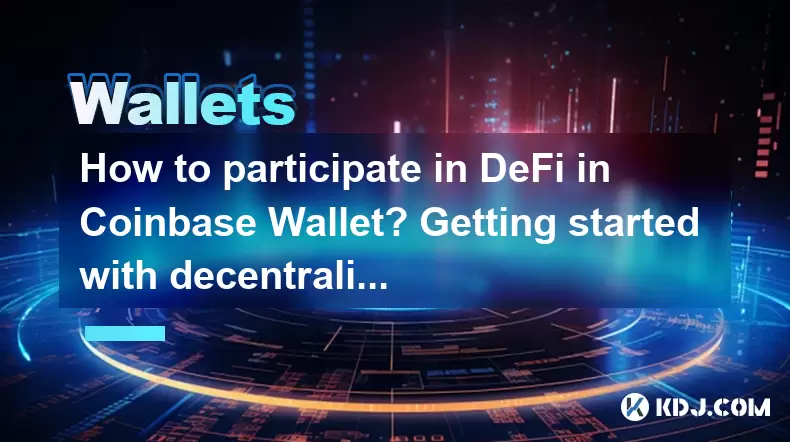
Participating in DeFi through Coinbase Wallet opens up a world of opportunities in the realm of decentralized finance. To get started, you'll need to understand the basics of DeFi, set up your Coinbase Wallet, and explore the various DeFi protocols available. This guide will walk you through the process step-by-step, ensuring you're well-equipped to dive into the exciting world of DeFi.
Understanding DeFi and Its Benefits
Decentralized Finance (DeFi) refers to financial services built on blockchain technology, primarily Ethereum, that operate without traditional intermediaries like banks. DeFi platforms allow users to lend, borrow, trade, and earn interest on their cryptocurrency holdings directly from their wallets. The benefits of DeFi include increased accessibility, transparency, and the potential for higher returns compared to traditional financial systems.
To participate in DeFi, you'll need a non-custodial wallet that supports Ethereum and other blockchain networks. Coinbase Wallet is an excellent choice because it offers a user-friendly interface and supports a wide range of DeFi protocols.
Setting Up Coinbase Wallet
To begin your DeFi journey, you'll need to set up a Coinbase Wallet. Here's how to do it:
- Download the Coinbase Wallet app: Available on iOS and Android devices, you can download the app from the respective app stores.
- Create a new wallet: Open the app and follow the prompts to create a new wallet. You'll be asked to set a strong password and back up your recovery phrase. This phrase is crucial for accessing your funds, so store it securely.
- Add funds to your wallet: You can transfer cryptocurrency from your Coinbase account or another wallet to your Coinbase Wallet. To do this, go to the "Send" tab, enter the amount and the cryptocurrency you want to send, and use the wallet address provided by Coinbase Wallet.
Connecting to DeFi Protocols
Once your Coinbase Wallet is set up and funded, you can start exploring DeFi protocols. Here's how to connect to them:
- Open the Coinbase Wallet app: Navigate to the "Explore" tab to see a list of supported DeFi protocols.
- Select a protocol: Choose a protocol that interests you, such as Uniswap for decentralized trading or Compound for lending and borrowing.
- Connect your wallet: When you select a protocol, you'll be prompted to connect your Coinbase Wallet. Click "Connect" and follow the on-screen instructions to authorize the connection.
Participating in DeFi Activities
With your wallet connected, you can now participate in various DeFi activities. Here are some common activities and how to engage in them:
- Swapping Tokens: On platforms like Uniswap, you can swap one cryptocurrency for another. To do this, select the tokens you want to swap, enter the amount, and confirm the transaction. You'll need to pay a small gas fee for the transaction to be processed on the Ethereum network.
- Lending and Borrowing: Platforms like Compound allow you to lend your cryptocurrency to earn interest or borrow against your holdings. To lend, select the asset you want to lend, enter the amount, and confirm. To borrow, choose the asset you want to borrow, set the collateral, and confirm the transaction.
- Yield Farming: Some DeFi protocols offer yield farming opportunities where you can stake your tokens to earn additional rewards. To participate, navigate to the yield farming section of the protocol, select the pool you want to join, and stake your tokens.
Managing Your DeFi Investments
As you engage in DeFi activities, it's essential to manage your investments wisely. Here are some tips:
- Monitor your positions: Regularly check your lending, borrowing, and staking positions to ensure they align with your financial goals.
- Understand the risks: DeFi comes with risks, including smart contract vulnerabilities and market volatility. Always do your research and only invest what you can afford to lose.
- Keep your wallet secure: Never share your recovery phrase or private keys with anyone. Use strong passwords and consider using hardware wallets for added security.
Troubleshooting Common Issues
While participating in DeFi, you may encounter some common issues. Here's how to troubleshoot them:
- Transaction Failures: If a transaction fails, check your gas fee settings. Sometimes, increasing the gas fee can help the transaction go through faster. You can adjust the gas fee in the Coinbase Wallet settings.
- Connection Problems: If you're having trouble connecting to a DeFi protocol, ensure your internet connection is stable and try restarting the app. If the issue persists, check the protocol's official channels for any reported outages.
- Lost Recovery Phrase: If you lose your recovery phrase, you'll lose access to your funds permanently. Always store your recovery phrase in a secure location, such as a safe or a secure note-taking app.
Frequently Asked Questions
Q: Can I use Coinbase Wallet on a desktop computer?
A: Yes, you can use Coinbase Wallet on a desktop computer by accessing the Coinbase Wallet extension for Chrome or Firefox. The process of setting up and using the wallet is similar to the mobile app, but you'll need to download the extension from the respective browser's extension store.
Q: Are there any fees associated with using DeFi protocols through Coinbase Wallet?
A: Yes, there are fees associated with using DeFi protocols. These include gas fees for transactions on the Ethereum network and potential protocol-specific fees. Always check the fee structure of the DeFi protocol you're using to understand the costs involved.
Q: How can I ensure the security of my funds in DeFi?
A: To ensure the security of your funds in DeFi, always use reputable protocols, keep your software and wallets updated, and never share your private keys or recovery phrases. Additionally, consider using hardware wallets for added security and diversify your investments to mitigate risks.
Q: Can I participate in DeFi with cryptocurrencies other than Ethereum?
A: Yes, while Ethereum is the most common blockchain for DeFi, other blockchains like Binance Smart Chain and Polygon also support DeFi protocols. Coinbase Wallet supports multiple blockchains, allowing you to participate in DeFi across different networks.
Disclaimer:info@kdj.com
The information provided is not trading advice. kdj.com does not assume any responsibility for any investments made based on the information provided in this article. Cryptocurrencies are highly volatile and it is highly recommended that you invest with caution after thorough research!
If you believe that the content used on this website infringes your copyright, please contact us immediately (info@kdj.com) and we will delete it promptly.
- DeFi Token Summer Gains: Is Mutuum Finance the Real Deal?
- 2025-08-02 18:30:12
- Bitcoin, Realized Price, and the Top: Are We There Yet?
- 2025-08-02 18:30:12
- Phishing, Wallets, and Stolen Funds: Staying Safe in the Wild West of Crypto
- 2025-08-02 16:30:12
- Rare Coin Alert: Is That 50p in Your Pocket Worth £10,000?
- 2025-08-02 16:30:12
- Arbitrum (ARB) Price Prediction: Oversold Signal or Breakout Imminent?
- 2025-08-02 16:55:36
- Arbitrum (ARB): Navigating Price Dips, PayPal Perks, and the Road Ahead
- 2025-08-02 17:00:12
Related knowledge

What is a watch-only wallet in Trust Wallet?
Aug 02,2025 at 03:36am
Understanding the Concept of a Watch-Only WalletA watch-only wallet in Trust Wallet allows users to monitor a cryptocurrency address without having ac...

How to switch between networks in Trust Wallet?
Aug 02,2025 at 12:36pm
Understanding Network Switching in Trust WalletSwitching between networks in Trust Wallet allows users to manage assets across different blockchains s...
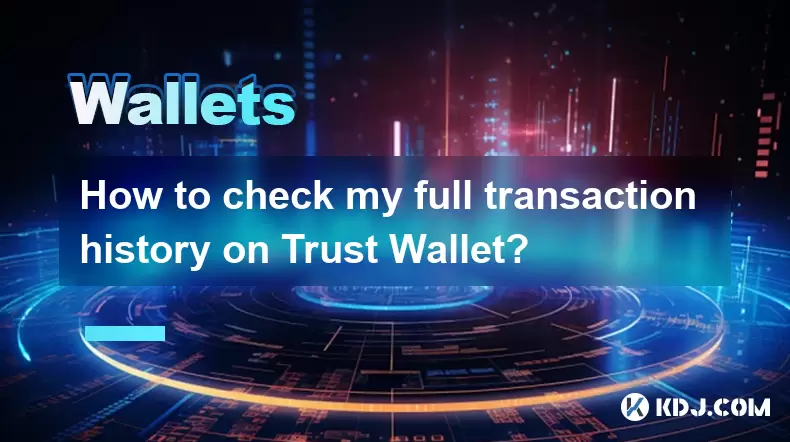
How to check my full transaction history on Trust Wallet?
Aug 02,2025 at 09:24am
Understanding Transaction History in Trust WalletTrust Wallet is a widely used non-custodial cryptocurrency wallet that supports a broad range of bloc...
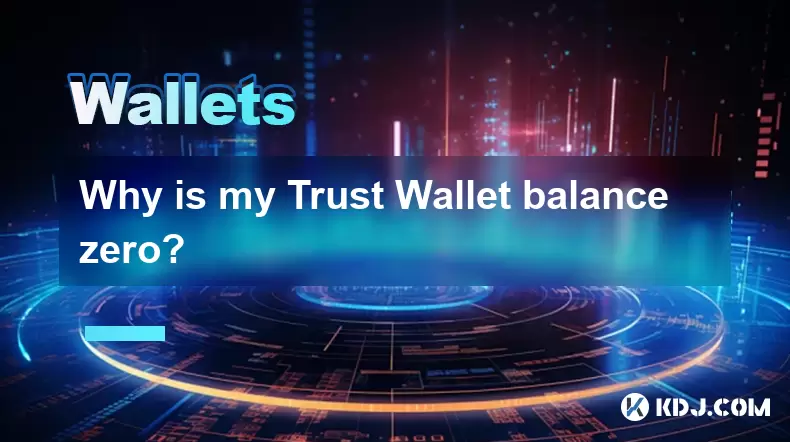
Why is my Trust Wallet balance zero?
Aug 02,2025 at 03:49am
Understanding Trust Wallet Balance Display IssuesIf you're seeing a zero balance in your Trust Wallet despite knowing you've previously received or se...
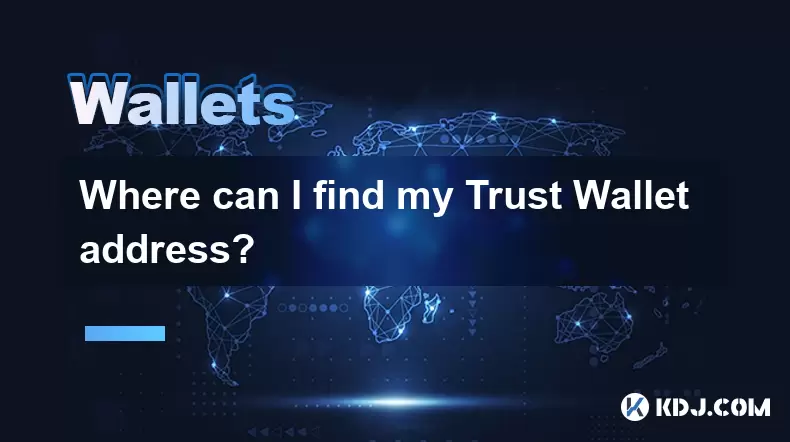
Where can I find my Trust Wallet address?
Aug 02,2025 at 06:07pm
Understanding Your Trust Wallet AddressYour Trust Wallet address is a unique identifier that allows others to send you cryptocurrency. It is a string ...
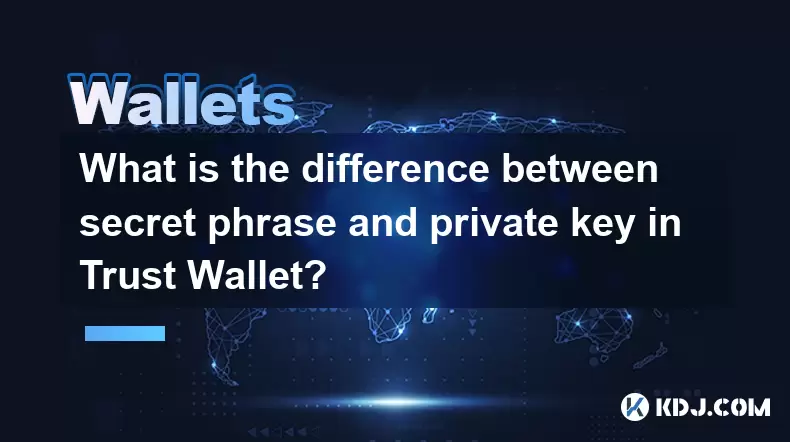
What is the difference between secret phrase and private key in Trust Wallet?
Aug 02,2025 at 09:49am
Understanding the Role of a Secret Phrase in Trust WalletThe secret phrase, also known as a recovery phrase or seed phrase, is a sequence of 12 or 24 ...

What is a watch-only wallet in Trust Wallet?
Aug 02,2025 at 03:36am
Understanding the Concept of a Watch-Only WalletA watch-only wallet in Trust Wallet allows users to monitor a cryptocurrency address without having ac...

How to switch between networks in Trust Wallet?
Aug 02,2025 at 12:36pm
Understanding Network Switching in Trust WalletSwitching between networks in Trust Wallet allows users to manage assets across different blockchains s...

How to check my full transaction history on Trust Wallet?
Aug 02,2025 at 09:24am
Understanding Transaction History in Trust WalletTrust Wallet is a widely used non-custodial cryptocurrency wallet that supports a broad range of bloc...

Why is my Trust Wallet balance zero?
Aug 02,2025 at 03:49am
Understanding Trust Wallet Balance Display IssuesIf you're seeing a zero balance in your Trust Wallet despite knowing you've previously received or se...

Where can I find my Trust Wallet address?
Aug 02,2025 at 06:07pm
Understanding Your Trust Wallet AddressYour Trust Wallet address is a unique identifier that allows others to send you cryptocurrency. It is a string ...

What is the difference between secret phrase and private key in Trust Wallet?
Aug 02,2025 at 09:49am
Understanding the Role of a Secret Phrase in Trust WalletThe secret phrase, also known as a recovery phrase or seed phrase, is a sequence of 12 or 24 ...
See all articles

























































































